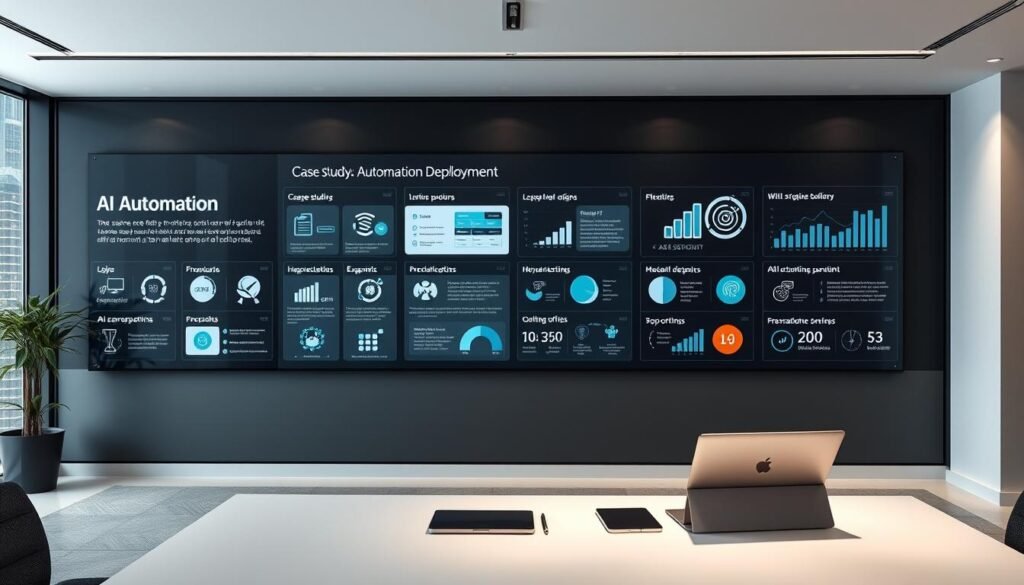Are AI Automation Agents the Future of Work? Here’s What You Need to Know!
A recent study by Gartner found that by 2025, AI agents will create 20% of all business content. This illustrates the significant role AI is playing in the workplace. These smart agents are performing tasks that were once reserved for humans, and even more complex ones.
As we move towards an AI-led future, it’s key to know how AI agents will change work. Working together with humans, these agents could make work more efficient. They could also change how we see different industries. Let’s explore how AI agents are changing the game.
Key Takeaways
- AI Automation Agents are set to handle 20% of all business content creation by 2025.
- These agents optimize processes and enhance productivity in the workplace.
- AI technologies are now capable of performing complex tasks, not just routine ones.
- The future of work involves seamless collaboration between human workers and intelligent agents.
- Understanding AI automation agents is key to using their full power in various industries.
Introduction to AI Automation Agents
AI Automation Agents are advanced software programs. They use Artificial Intelligence Software to make tasks easier and processes smoother. These agents can analyze data, predict trends, and make decisions on their own. This helps improve efficiency and reduce mistakes in many areas.
These agents are a big step up from old automation tools. They can think and make decisions like humans. They handle lots of data and give insights that help us work better.
Using Artificial Intelligence Software has many benefits. It can lower costs, increase accuracy, and boost productivity. AI Automation Agents are also very flexible. They work well in many fields, from finance to healthcare.
As we use AI Automation more, it’s clear these agents are more than tools. They are key assets that drive innovation and growth. They help businesses stay ahead in a fast-changing world. This shows how important Artificial Intelligence Software is for the future of work.
How AI Automation Agents Are Transforming Business Operations
AI Automation Agents are changing how businesses work. They make processes smoother and more efficient. By doing repetitive tasks, these agents let people focus on creative and strategic work. This leads to a big increase in Business Efficiency and Productivity Enhancement.
Increased Efficiency and Productivity
AI Automation Agents make businesses run faster and more accurately. They handle tasks like data entry and customer service. This means businesses can do more with less effort and fewer mistakes.
These agents work all the time without getting tired. They help companies reach their goals quicker and with better results.
Role-Based Automation Partners
AI Automation Agents can be tailored for different business roles, like sales and HR. This makes each department work better. It lets employees spend more time on tasks that really matter.
By focusing on what they do best, these agents help both people and machines work better together. This is the heart of role-based automation in businesses.
The Evolution of AI Agents in the Workplace
The journey of AI Evolution in the workplace has seen big steps forward. At first, AI agents were simple bots that did basic tasks. Now, they are advanced and can learn and change as needed.
The push for Workplace Automation has been a key factor. Businesses want to work better and faster. AI agents can handle complex tasks, analyze data, and make choices on their own.
Old AI agents needed to be programmed step by step. But today’s AI uses machine learning to understand and use lots of data. This makes them key in Workplace Automation. They help make decisions, predict trends, and talk to people easily.
This ongoing AI Evolution is changing the workplace. It’s making companies more flexible and strong. By using advanced AI, businesses can improve how they work, make employees happier, and stay ahead in the market.
Artificial Intelligence Software Enhancing Customer Experiences
In today’s digital world, businesses are using artificial intelligence software to change how they talk to customers. This technology, known as Customer Experience AI, makes interactions better and more efficient. It includes conversational AI agents and virtual assistants for customer support.
Conversational AI Agents
Conversational agents are changing customer service by making communication smooth and personal. These AI tools can understand and answer customer questions quickly, giving accurate information right away. They use natural language processing to talk like humans, making conversations feel more natural.

Virtual Assistants for Customer Support
Virtual assistants are key in AI customer support. They do many things, from answering simple questions to handling complex issues. With advanced algorithms and machine learning, they offer proactive support, meeting customer needs before they ask.
This approach not only makes things more efficient but also makes customers happier and more loyal. Using Customer Experience AI, businesses can improve their customer service, leading to success now and in the future.
Intelligent Automation Tools and Their Business Benefits
Intelligent automation tools use advanced AI to make business processes smoother. Companies gain many benefits by using these tools. These benefits help their bottom line a lot.
One big advantage is saving money and working more efficiently. These tools handle complex tasks and cut down on mistakes. This lets employees focus on important tasks.
Businesses get better accuracy and faster work. This means they can do more in less time. It’s a win for productivity.
Automation tools also grow with your business. You can change your processes easily without spending a lot. This is great for companies that are growing fast.
Also, these tools help follow rules and standards better. AI makes sure things are done right every time. This is a big plus for businesses.
Intelligent automation is changing how businesses work. It helps companies stay ahead, adapt fast, and improve their services. It’s a game-changer for many industries.
AI Automation Agents in Software Development
AI Automation Agents are changing software development. They connect low-code platforms with advanced AI. This makes coding faster and more efficient.
From Low-Code Platforms to Advanced AI Solutions
Low-code platforms have helped developers for years. But AI takes it further. AI Automation Agents make complex tasks easier by writing code and fixing errors.
This lets developers spend more time on creative work. They don’t get bogged down in coding details.
Role of Generative AI in Coding
Generative AI is a big deal in coding. It can write code, find and fix bugs, and improve algorithms. Using Generative AI makes coding faster and better.
This speeds up software development. It also makes sure the apps are strong and reliable.

AI Automation Agents, Generative AI, and low-code platforms are changing things. Here’s how they help:
| Feature | Low-Code Platforms | AI Automation Agents | Generative AI |
|---|---|---|---|
| Simplicity | High, with drag-and-drop interfaces | Moderate, with some coding needed | High, with automated code generation |
| Efficiency | Good, reduces hand-coding effort | Excellent, streamlines workflows | Exceptional, optimizes entire development processes |
| Error Reduction | Limited, manual code review needed | High, detects and fixes bugs automatically | Very High, self-learning capabilities |
AI-Powered Agents and Machine Learning Automation
In today’s fast-changing world, AI-powered agents and machine learning are changing business forever. These agents use machine learning to understand huge amounts of data. They find patterns and make choices with little human help.
This makes complex tasks easier and more accurate. It also helps them adapt quickly to new situations.
AI-powered agents rely heavily on machine learning. They get better at making decisions as they learn from new data. This means they can do tasks more efficiently and accurately over time.
Adding machine learning to these agents makes businesses better at complex tasks. For example, they can predict sales, spot unusual patterns, and give insights for big decisions.
Let’s look at how AI-powered agents with and without machine learning compare:
| Feature | With Machine Learning Automation | Without Machine Learning Automation |
|---|---|---|
| Data Pattern Recognition | High Accuracy | Moderate Accuracy |
| Adaptability | Dynamic and Continual Learning | Static, Requires Manual Updates |
| Decision-making Speed | Real-time | Slower and Often Requires Human Review |
| Error Rate | Low | Higher |
Using AI-powered agents with machine learning makes businesses more efficient. It helps them stay ahead in a world where technology is getting smarter. As AI keeps improving, it will change how we work and use technology even more.
The Growth of the AI Agent Market
Exploring the AI Agent Market Growth is essential. We must look at current AI Trends and strategies from top AI Vendors. The market is booming, thanks to growing demand for automation and smart solutions in various sectors. This part dives into market trends and key platforms, showing how the market has evolved and what’s expected in the future.
Market Trends and Projections
Several trends are driving the AI Agent Market Growth. One major trend is AI agents becoming part of daily business, making operations more efficient and productive. Companies are using AI to improve processes and offer tailored customer experiences. Advances in AI Trends like machine learning and natural language processing are making AI more powerful and effective. Experts predict the market will keep growing, reaching new levels in the next decade.
Key Platforms and Vendors
Understanding the AI Vendor landscape is vital for businesses. Big names like IBM, Microsoft, and Google are leading with advanced AI technologies and solutions. These giants are not just setting AI Trends but also providing wide-ranging platforms for different business needs. Newcomers are also bringing fresh ideas, pushing the AI Agent Market Growth forward. Here’s a look at some major players:
| Company | Key Offerings | Market Impact |
|---|---|---|
| IBM | Watson, Cloud Pak for Data | Leading AI-driven business solutions |
| Microsoft | Azure AI, Dynamics AI | Comprehensive AI services across sectors |
| Google AI, AutoML | Innovations in machine learning and data analytics |
Virtual Assistants vs AI Automation Agents: Understanding the Difference
Exploring Virtual Assistants and AI Automation Agents shows us their unique roles. Both aim to make work easier, but they serve different needs. Virtual Assistants are great for simple tasks, while AI Agents handle complex ones.
Virtual Assistants like Siri or Alexa are perfect for everyday tasks. They can set reminders, answer questions, and manage your schedule. They’re easy to use because they understand natural language.
AI Automation Agents, on the other hand, are powerful for business tasks. They use advanced AI to learn and analyze data. This lets them do things like data analysis and make decisions. They get better over time, making businesses more efficient.
| Type | Functions | Adaptability | Examples |
|---|---|---|---|
| Virtual Assistants | Routine tasks, natural language processing | Low | Siri, Alexa, Google Assistant |
| AI Automation Agents | Complex tasks, data analysis, decision-making | High | IBM Watson, UiPath, Automation Anywhere |
In our AI Agents Comparison, we see a clear difference. Virtual Assistants are quick and easy for simple tasks. But AI Automation Agents are better for complex business tasks. They learn and adapt, making businesses more efficient.
Intelligent Automation Software in Various Industries
Intelligent Automation Applications have changed many sectors, bringing us into a new era. They make operations more efficient and innovative. AI is making big changes in IT, manufacturing, and healthcare, opening up new possibilities.
Technology and IT Services
In tech and IT, automation is key for better workflows and service. It lets IT teams work on big projects, not just routine tasks. AI helps IT teams handle data and meet demands quickly.
Manufacturing and Retail
AI is changing manufacturing and retail. It makes production better, cuts waste, and boosts productivity. It also gives real-time data and helps predict when machines need repairs.
Retail gets better with AI too. It helps manage stock, guess what customers want, and make shopping personal.
Healthcare and Medical Services
AI is a game-changer in healthcare. It makes patient care and diagnosis better. It helps manage patient data, makes admin tasks easier, and aids in making medical decisions.
With AI, healthcare can be more accurate and patient-focused. It makes care more tailored and effective.

Challenges and Risks of Implementing AI Automation Agents
Using AI Automation Agents in different fields comes with its own set of challenges. We need to focus on keeping data safe and using AI ethically. This part will explore these important topics.
Data Integrity and Governance
Keeping data safe is key to AI success. Data Governance frameworks help manage and protect data. They lower the chance of data breaches and follow laws like GDPR and CCPA.
Good governance means we get accurate and reliable data. This avoids expensive mistakes and legal issues.
Bias and Ethical Concerns
Dealing with AI bias is a big challenge. Ethical AI practices help by testing and validating AI models. Using clear methods and diverse data is important for fairness.
By tackling AI Challenges head-on, we build trust. This promotes the right use of AI technology.
Case Studies of Successful AI Automation Deployment
AI Deployment Case Studies show great progress in many areas. They show how companies use AI to make workflows smoother and work better. Looking at AI Success Stories helps us learn from their strategies and results.
“One of our clients successfully integrated AI agents into their supply chain management, leading to a 40% reduction in operational costs and a significant improvement in inventory accuracy.”
Let’s explore these AI Deployment Case Studies more. We’ll focus on real results and numbers. Below, we have a table with important data from several successful uses.

| Company | Industry | AI Solution | Outcome |
|---|---|---|---|
| Amazon | Retail | AI-Powered Robotics | 30% increase in order fulfilment efficiency |
| Technology | Machine Learning Algorithms | Enhanced accuracy in predictive analytics | |
| Pfizer | Healthcare | AI for Drug Discovery | Reduced time to market for new medications by 20% |
These AI Success Stories show how AI can change things for the better. They highlight big improvements and cost savings. As AI keeps getting better, we’ll see more success stories from different fields.
How AI Automation Agents Improve Employee Morale and Satisfaction
Using AI automation agents in the workplace can greatly improve employee satisfaction and morale. These agents take over boring tasks, making work more interesting and creative.
Simplifying Routine Tasks
AI agents are great at handling routine tasks like data entry and customer service. This frees up employees to do more exciting work. As a result, they feel happier and more engaged at work.
Enabling Focus on Higher-Value Activities
AI agents also help employees focus on important tasks. They spend more time on creative projects and solving problems. This makes employees feel more valued and satisfied, leading to a positive work culture.
The Future of AI Automation Agents in the Enterprise Workspace
The future of AI looks bright, and it’s big in the enterprise world. As we move forward, we see more use of AI agents to boost innovation and work efficiency.
These AI agents will soon be key parts of our workspaces. They’ll give us deep insights and handle tough tasks easily. This change will make our workflow better, helping us work smarter.
To understand how AI agents will change things, let’s look at what they can do now and what they’ll do in the future:
| Aspect | Current Capabilities | Future Enhancements |
|---|---|---|
| Decision-Making | Basic data analysis | Advanced predictive analytics |
| Task Automation | Routine task completion | Complex process automation |
| Integration | Individual system integration | Holistic enterprise integration |
| User Interaction | Scripted responses | Adaptive conversational agents |
By using these new tools, companies can keep up with AI trends. This helps them stay ahead in a world that’s always changing. It’s key for businesses to invest in these technologies to stay competitive and keep innovating.
Scaling AI Automation Agents for Large Enterprises
Scaling AI automation agents in big companies opens up new ways to work more efficiently. By using AI in different areas like IT and finance, businesses can make better decisions and make things run smoother.
IT and Finance Department Use Cases
In IT and finance, AI is used for things like predicting trends and making reports automatically. By growing AI, these teams can handle big data better. This gives them insights and helps them make decisions faster.
| Use Case | Department | Benefit |
|---|---|---|
| Predictive Analytics | Finance | Enhanced Forecasting |
| Automated Reporting | IT | Efficiency in Data Handling |
Customer Success and Support Benefits
In customer success and support, AI makes talking to customers and solving problems better. These AI agents give quick answers and personal touches, making customers happier and more loyal.
AI strategies for customer success use agents to answer many questions. This means people can focus on harder tasks. It also makes the service better and more efficient.
Conclusion
As we wrap up our look at AI Automation Agents, it’s clear they’re changing the game for businesses. These tech advancements make AI agents key players in how we work and interact with customers. They bring unmatched efficiency and effectiveness to the table.
Looking at examples from many industries, we see AI’s power to boost productivity. It lets employees tackle important tasks, not just routine ones. This is a big win for businesses.
AI’s future looks bright and necessary. It will keep getting better at helping humans and changing how we do things. Soon, AI will be everywhere, from coding to customer service, making everything better.
We need to be careful with AI, though. We must keep data safe, handle ethics, and have strong rules. This way, we can use AI’s power without running into problems.
AI is set to change the workplace in big ways. It promises a future of more productivity and creativity. With the right plan and watchful eye, we can make the most of AI to move our industries forward.




